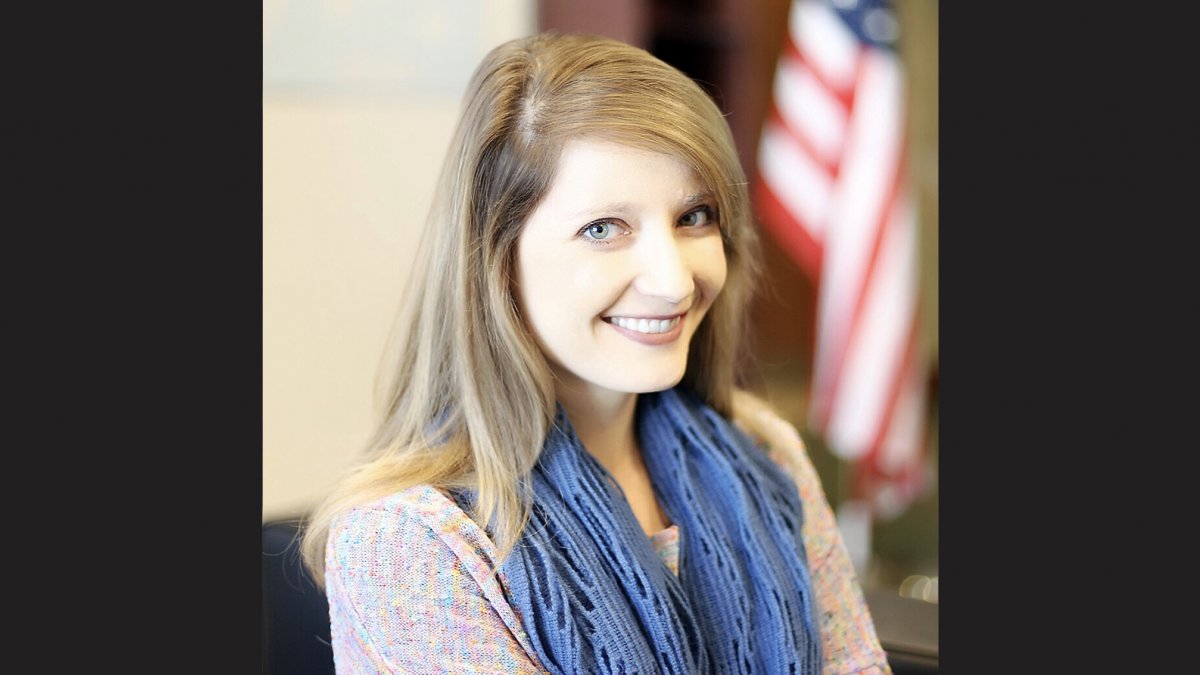Searching for global energy solutions, Olga Khakova finds immediate use for her environmental assessment master’s degree

Only a short time ago, she was learning about soil health on one of the “famous” KUEC soil field trips. Now she spends her time looking for ways the U.S. and the European Union (EU) can collaborate on energy security. That’s how quickly life has changed for 30-year-old outstanding KUEC graduate Olga Khakova. She will graduate this summer with a Professional Science Master’s in Environmental Assessment and a focus in policy from KU Edwards Campus in Overland Park, Kansas.
“Through her original idea for her capstone project she found a connection to a policy group in Washington D.C. who then offered her a position,” said Director of Environmental Assessment Programs Terri Woodburn. “She is currently traveling the globe with that team and is finishing up her capstone.”
A native of Mykolaiv, Ukraine, Khakova is the Associate Director for European Energy Security at the Atlantic Council. She is married to her husband, Aaron, and they have two cats.
Discover more about Khakova and read her comprehensive advice for anyone considering earning a college degree.
Q: Why did you choose KUEC?
A: The master’s degree is essential for succeeding in my field. The degree opened employment opportunities that otherwise would not be available.
Q: How did KUEC meet your personal and/or academic needs?
A: KUEC has met my academic needs by providing me with a diverse group of professors who all have different teaching methods and views on the world. I have been challenged by the coursework in general. I was taught how to grasp challenging concepts and theories. I believe this helped to me to have a better understanding of my world and the community around me.
Q: How has your KUEC degree prepared you for the future?
A: Working on energy and environmental issues can get technical quickly. The science components of the program gave me the background to break down complex information into formats accessible to the greater public. I like how interdisciplinary the PSM is because it reflects the realities of today’s jobs that require diverse skills to succeed. My day could consist of putting together a budget, managing an event planning process, writing a brief, or moderating a panel.
Q: What was the most difficult part of earning your college degree and how did you overcome it?
A: I worked full-time while completing my master’s and moved to Washington, D.C. while completing my capstone project. It took a lot of discipline, hard work and a supportive partner.
Q: What is your proudest accomplishment?
A: I am proud of my work at the Atlantic Council where I get to look at specific ways the U.S. and EU can collaborate on energy security. From my time in Kansas, I truly enjoyed helping develop the Clean Energy Business Council at the Climate + Energy Project.
Q: What is your favorite memory of your time at KUEC?
A: I enjoyed the soils class field trips. Understanding the science behind soil health was one of my favorite topics at KU (and this says a lot coming from an energy gal).
Q: What are your long-term career goals and how do you plan to achieve them?
A: My career goals are less about a specific title or organization, and more about the issues I want to continue working on and the “how” of the energy and environment trends such as climate change, digitalization, electrification, population growth, geopolitical conflicts, cybersecurity threats and many more will require solutions at all levels of the society and from all sectors. I am passionate about convening people to find and implement solutions and hope to continue doing that, whether it’s through public engagement, policy work, or corporate leadership.
Q: What advice would you give others who are thinking of earning a degree, whether a first-time bachelor’s, a second bachelor’s or a master’s?
A: • Higher education will become even more important as multiple sectors become automated. Some jobs require a master’s just to apply, in others, a master’s degree will make an applicant stand out. Nevertheless, technical colleges are important to consider as well for those who are not ready for a traditional college track.
- Talk to people who are working in the areas you are interested in. Talk to the KU students who graduated with the PSM. Most professionals are happy to share their experience.
- If you are not sure about going to college, take it slow: enroll in one or two classes at a time, explore new subjects, get to know your professors. Do your research on what level of education/ what type of degree is required for the field of interest.
- Don’t limit your goals and aspirations. You are capable of so much more than you think.
- It’s okay to push your limits and fail – failing can be glorious: I had the most disastrous interview as I prepared to graduate with my bachelor’s degree. Looking back, I am grateful that company did not call me back.
- There is nothing wrong with having multiple careers: many skills transfer over. My bachelor’s of administration with an emphasis in marketing did not discourage me from going into an environmental/energy field. (Also, my first career was in aviation safety).
- Ask for help and be resourceful. People love feeling helpful - let them.
- Be resilient and don’t give up on your career dreams. Persistency and hard work pay off more than natural talent.
Learn more about the Professional Science Master’s in Environmental Assessment from KUEC.





